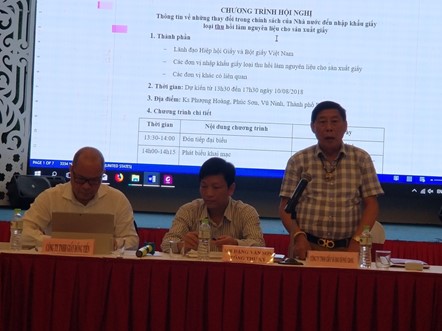
Vietnamese customs tighten import of scrap paper.
Image courtesy of vppa.vn
In early August, the Executive Board of the Vietnam Pulp & Paper Association held a seminar to communicate information to members about the changes of state management agencies in licensing, managing imported materials which are used as raw materials for paper enterprises, as well as to discuss and make recommendations to state management agencies on these changes.
The tightening of import of paper at the customs has caused considerable impact to the paper enterprises in Vietnam.
Within 15 days (from June 26th to July 10th), paper mills sent reports to the association for an estimated VND30 billion in damages for container fees, past due fees, fees due to stopping the production machine.
According to the chairman of the Vietnam Paper and Paper Association, Mr.Dang Van Son said that state management agencies must tighten the import quantity of scraps in order to thoroughly supervise and avoid the situation of enterprises taking advantage of them. Importing residues caused polluting the environment, affecting the quality of life and health of the people. The General Department of Customs issued two documents 3438 and 3738 at the earliest possible time with immediate effect, in which the requirement for the goods to be collected must be sent to the Customs Inspection Department. The analysis does not specify the sampling time, the time to return the results of the assessment makes the business fails to keep up.
As a result, only items of recovered paper imported as raw materials for production following the standards, which is Certificate of conformity of Environmental Engineering standards of an assessment organization designated by Ministry of Natural Resources and Environment, the Department of Expertise Customs, are able to get through the customs. This leads to increased clearance time for goods lots, causing congestion at ports, increased storage and warehousing costs and other expenses of enterprises, affecting production and business activities. This is a great challenge for enterprises to compete with other kinds of foreign products in domestic and foreign markets.
On the other hand, paper production (including recycled paper) is not a conditional business; The world has had a number of policies to support the collection and recycling of paper and does not consider used paper as raw materials for the production of recycled paper like waste paper, but called it the paper recovered (recycled paper) and do not manage this item as all other scra
Vietnam is a large exporter, packaging is a very important item for export goods, the amount of paper packaging used annually is very large, while the paper for packaging is mainly made from raw materials are paper recovered for import. In addition, paper production is not a conditional business. However, the regulations on the import of paper recovered as raw materials for production have considered paper recovered as all other types of scrap. While the world has been known used paper as recycled paper, there are many policies that support the collection and recycling of paper. Therefore, we should consider studying the classification of scrap paper.
In order to reduce the amount of imported scrap, the State should have policies to improve the collection and recycling of paper effectively, encouraging consumers to be more aware of the consumption of paper products that contribute also. The environmental protection section restricts the import of scrap paper, etc.
To find out more about domestic and international paper markets, visit the International Exhibition & Conference on Paper and Pulp industry in Vietnam at the Saigon Exhibition and Convention Center (SECC) from 26 - June 28, 2019.
Source: rippi.com.vn

